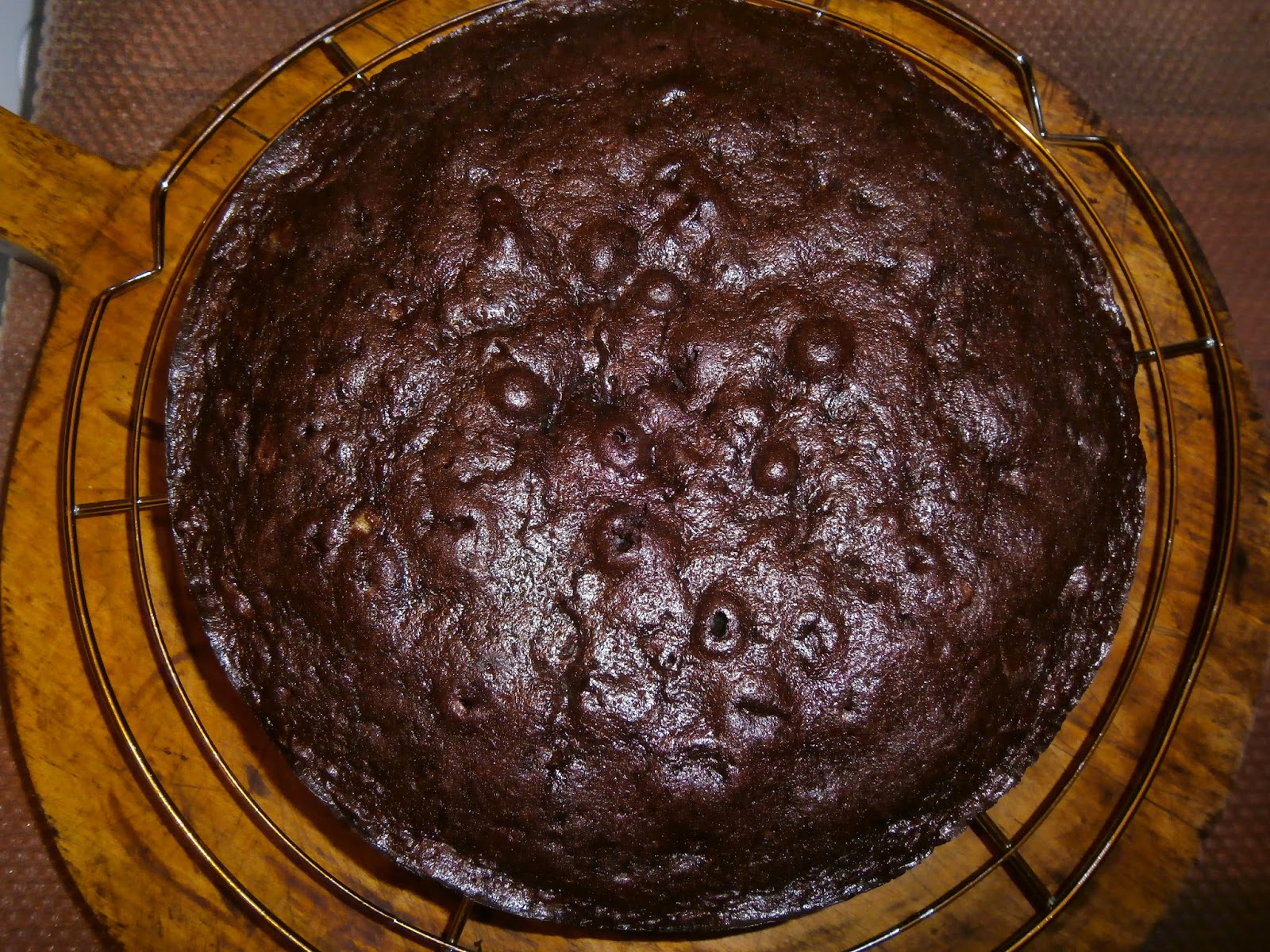De Crăciun nu
putea să lipsească un dulce portughez. Mai ales că nu am mai făcut unul de
multă vreme. Din mulţimea de reţete tradiţionale sau mai moderne, am ales
această prăjitură, foarte aromată, cu multe fructe uscate şi confiate, cu multă
cacao şi nu foarte dulce în ciuda cantităţii destul de mari de zahăr.
Din cantităţile
de mai jos ies două prăjituri coapte într-o formă rotundă de circa 25 cm
diametru, dar se poate coace tot aluatul într-o tavă de guguluf – în acest caz,
timpul de coacere va fi mai mare. Eu am ales prima variantă, pentru că voiam să
duc această prăjitură la o petrecere şi, văzând că mi-a ieşit destul de mult aluat,
am profitat pentru a lăsa şi acasă o mostră. Rămâne deci la alegerea voastră.
- 230 g unt, la temperatura camerei
- 5 ouă
- 500 g zahăr
- 110 g cacao
- 220 ml lapte de cocos
- 1 linguriţă extract de vanilie
- un vârf sare
- ½ linguriţă coajă rasă de lămâie (opţional)
- 290 g + 70 g făină
- 150 g stafide
- 150 g fructe confiate, tăiate cubuleţe
- 1 lingură praf de copt
Separăm gălbenuşurile de albuşuri.
Mixănd în
continuare, adăugăm laptele de cocos, vanilia, sarea şi coaja rasă de lămâie (eu
am renunţat la ea pentru că am folosit multă coajă confiată de lămâie).
Încorporăm treptat
cele 290 g făină, folosind o lingură de lemn. La final mixăm bine pentru a
omogeniza aluatul.
Batem albuşurile
spumă şi le încorporăm în aluat (ştiţi deja regula: mai întâi o treime, apoi
restul).
Peste acest
amestec punem stafidele şi fructele confiate şi amestecăm bine pentru a le
acoperi cu făină.
Turnăm aluatul (sau
jumătate de aluat) într-o tavă unsă cu unt şi tapetată cu făină sau cu hârtie
de copt.
Coacem prăjitura
în cuptorul încins, la foc potrivit, pentru circa 40 de minute – după vreo 20
de minute, micşorăm puţin focul, ca să nu ardem prăjitura.
Verificăm prăjitura
cu o scobitoare, iar dacă aceasta iese curată, prăjitura este gata.
Timpul acesta
este pentru jumătate de aluat. Dacă vreţi să coaceţi o singură prăjitură, va fi
nevoie probabil de 60-70 de minute – cel mai bine este să verificaţi prăjitura
cu scobitoarea şi dacă mai e nevoie, o mai lăsaţi 5 minute şi o verificaţi iar.
Vă recomand, de asemenea, să puneţi pe raftul de jos al cuptorului o tavă cu
apă rece – astfel nu riscaţi să se ardă prăjitura.
*********************************************************************************************
Enjoy!
Christmas couldn’t have
passed without a Portuguese cake. Especially since I haven’t made one in a long
time. From the many traditional or more modern recipes, I chose this cake, very
flavored, with lots of dried and candied fruits, cocoa and, in spite of the
large quantity of sugar, not too sweet.
With these quantities,
you get two cakes baked in a 25 cm cake pan, but you can also bake the whole
batter once in a gugelhupf pan – in this case, it will take longer to bake it. I
chose the first option, because I wanted to make this cake for a party and,
when I saw that there is enough batter for two, I thought to leave one cake at
home. So, it’s up to you.
PORTUGUESE CHRISTMAS
CAKE
- 230 g butter, at room temperature
- 5 eggs
- 500 g sugar
- 110 g cocoa
- 220 ml coconut milk
- 1 teaspoon vanilla extract
- a pinch of salt
- ½ teaspoon lemon zest (optional)
- 290 g + 70 g flour
- 150 g raisins
- 150 g candied fruits, cut into cubes
- 1 tablespoon baking powder
Separate yolks and
whites.
Mix butter, yolks and
sugar until smooth.
Fold in the cocoa,
using a spoon, then mix well.
Without stopping
mixing, add the coconut milk, vanilla, salt and lemon zest (I didn’t use it,
because I used afterwards a lot of candied lemon peel).
Fold in gradually the
290 g flour, using a wooden spoon. Finally, mix well to smooth the batter.
Whisk the whites, then
fold them in the batter (you already know the rule: firstly one third, then the
rest).
Mix the 70 g flour
with the baking powder.
Put in this mixture
the raisins and candied fruits and stir until all are covered with flour.
Add the fruits to the
batter and stir.
Pour the batter (or
half of it) into a greased and dusted or lined cake pan.
Bake the cake in the
preheated oven, to medium heat, for about 40 minutes – after 20 minutes, slightly
reduce the heat, to prevent the cake to burn.
Check the cake with a
toothpick; if it comes out clean, the cake is done.
The 40 minutes are
available for half of the batter. If you bake the whole batter once, you will
probably need about 60-70 minutes – it is better to check the cake with the
toothpick and if necessary, leave it in the oven for another 5 minutes, then
check again. I also recommend you to put under the cake another tray with cold
water – this way, it won’t burn.
Leave it 10 minutes to
cool in the pan, then transfer it on a wire rack.
Before serving, dust
it with icing sugar – I used a Christmas template, but a simple dusting is also
perfect!
Enjoy!































Niciun comentariu:
Trimiteți un comentariu